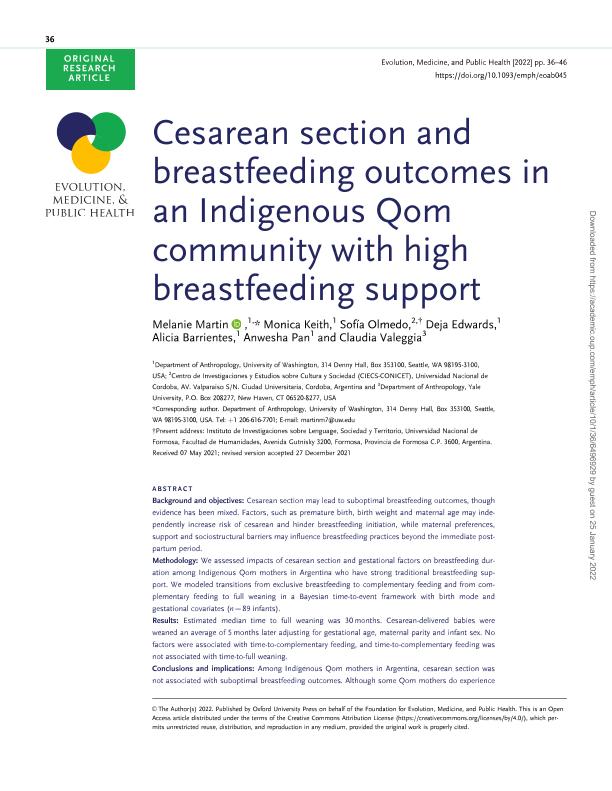Artículo
Cesarean section and breastfeeding outcomes in an Indigenous Qom community with high breastfeeding support
Martin, Melanie; Keith, Monica; Olmedo, Sofia Irene ; Edwards, Deja; Barrientes, Alicia; Pan, Anwesha; Valeggia, Claudia
; Edwards, Deja; Barrientes, Alicia; Pan, Anwesha; Valeggia, Claudia
 ; Edwards, Deja; Barrientes, Alicia; Pan, Anwesha; Valeggia, Claudia
; Edwards, Deja; Barrientes, Alicia; Pan, Anwesha; Valeggia, Claudia
Fecha de publicación:
01/2022
Editorial:
Oxford University Press
Revista:
Evolution, Medicine and Public Health
ISSN:
2050-6201
Idioma:
Inglés
Tipo de recurso:
Artículo publicado
Clasificación temática:
Resumen
Background and objectives: Cesarean section may lead to suboptimal breastfeeding outcomes, though evidence has been mixed. Factors, such as premature birth, birth weight and maternal age may independently increase risk of cesarean and hinder breastfeeding initiation, while maternal preferences, support and sociostructural barriers may influence breastfeeding practices beyond the immediate postpartum period. Methodology: We assessed impacts of cesarean section and gestational factors on breastfeeding duration among Indigenous Qom mothers in Argentina who have strong traditional breastfeeding support. We modeled transitions from exclusive breastfeeding to complementary feeding and from complementary feeding to full weaning in a Bayesian time-to-event framework with birth mode and gestational covariates (n = 89 infants). Results: Estimated median time to full weaning was 30 months. Cesarean-delivered babies were weaned an average of 5 months later adjusting for gestational age, maternal parity and infant sex. No factors were associated with time-to-complementary feeding, and time-to-complementary feeding was not associated with time-to-full weaning. Conclusions and implications: Among Indigenous Qom mothers in Argentina, cesarean section was not associated with suboptimal breastfeeding outcomes. Although some Qom mothers do experience early breastfeeding problems, particularly following first birth, problems are not more frequent following cesarean delivery. Traditional postpartum kin and community support during prolonged postpartum periods may be instrumental in helping mothers to overcome early breastfeeding problems due to cesarean or other risk factors. Lay Summary: We examined associations between cesarean section and breastfeeding transitions among Indigenous mothers in Argentina. Mothers delivering via cesarean section did not introduce complementary foods earlier, and conversely weaned later than mothers who delivered vaginally. Postpartum kin support typical of traditional birthing practices may help mothers overcome early breastfeeding problems.
Archivos asociados
Licencia
Identificadores
Colecciones
Articulos(SEDE CENTRAL)
Articulos de SEDE CENTRAL
Articulos de SEDE CENTRAL
Citación
Martin, Melanie; Keith, Monica; Olmedo, Sofia Irene; Edwards, Deja; Barrientes, Alicia; et al.; Cesarean section and breastfeeding outcomes in an Indigenous Qom community with high breastfeeding support; Oxford University Press; Evolution, Medicine and Public Health; 10; 1; 1-2022; 36-46
Compartir
Altmétricas



